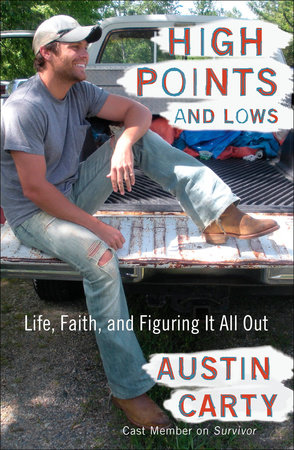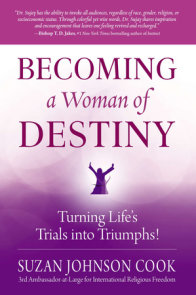READERS GUIDE
Questions and Topics for Discussion
INTRODUCTION
Austin Carty was a cast member on Survivor: Panama – Exile Island in 2006, but he isn’t content or comfortable being known solely as “that guy” who appeared on the reality TV show, ate bugs, and built barely functional lean-to’s. What he is content and comfortable with, he’s discovered, is his faith and his belief in something bigger than himself. And it’s this faith and this belief that’s led him to endure greater trials than a couple of months of outdoor living, or even surviving a monsoon dressed in a T-shirt.
Today, Carty travels across the world speaking to youth about being a Christian in a world that requires a unique set of survival skills – none of which, luckily, involve using a flint. He’s always wanted to write, though, and that desire has led, most recently, to this collection of candid essays.
In them, Carty explores his own experiences navigating religious fervor, spiritual confusion, academic dishonesty, superficial and genuine friendships, temporary employment and vocational purpose, and romantic entanglements. His frank disclosure, coupled with his gentle, self-deprecating humor, is disarming and endearing, and perhaps most importantly – accessible and relatable. Whether his readers identify as religious or secular, most will connect with Carty’s writing, and find his self-awareness and introspection both refreshing and inspiring.
ABOUT AUSTIN CARTY
Austin Carty was a contestant on Survivor in 2006 and is a popular Christian speaker. He lives in North Carolina.
A CONVERSATION WITH AUSTIN CARTY
Q. While you claim to have had War and Peace on your bookshelf mainly to impress others, it’s clear that you’re an avid reader. Who are your favorite authors, and why? Which books have had the biggest influence on you and your writing?
Yeah, you got me; I read quite a bit (though I’ve still never completed War and Peace!). I have so many favorites. C.S. Lewis will always be my #1. I fell in love with reading at age seven because of his The Lion, The Witch, and The Wardrobe, and since then, I have read and re-read nearly all of his material. I think he, more than any writer I’ve read, really knew what it meant to grapple with his own selfish nature— which is probably the theme I am most interested in exploring with my own material. I’m a sucker for all quality southern fiction, both classic and contemporary. Other favorites are Marilynne Robinson, Donald Miller, Anne Lamott, Dave Eggers, and Chuck Klosterman. I think (at least, I hope) that all of the authors I’ve listed have had some influence on my own writing.
Q. You self-published one book before High Points and Lows. Why did you switch from writing fiction to writing nonfiction? Do you intend to pursue creative nonfiction further? How did the process of writing essays differ from that of writing fiction, and what did you learn or discover about the writing process while composing this book?
I self-published that book when I was twenty-one, and it served as a really good apprenticeship regarding what a career as a writer might look like. The self-published book is definitely rough, and, looking back, there are some serious plot problems, but I learned what writing a book (and what trying to sell a book) was like from that experience. I worked on a couple other novels between that book and High Points and Lows, and I really believe that it was during that process when I really found my own voice. Years ago, I was asked by some fans to begin blogging, but instead of writing a daily blog, I began posting mini-essays with my thoughts on life and faith and pop culture. I found two things in the process: (1) I loved writing nonfiction, and (2) people seemed to enjoy what I wrote. Those early mini-essays served as the embryo for High Points and Lows. The two processes (nonfiction vs. fiction) aren’t as different as one might imagine— at least, they aren’t for me. Because my essays are story driven, the formula with which I approach them is somewhat the same as when approaching fiction (only, with essays, you are dealing with the constraints of length and telling the truth). I absolutely loved working on the essays in this collection, because I learned quite a bit about myself— and about writing— in the process: from deep insecurities I’ve tried to avoid facing in my personal life to what time and patience and dedication it takes to compile an entire book of essays.
Q. You give some words of encouragement to aspiring writers on your acknowledgements page, but what specific advice would you give to a young writer who might be struggling to publish his or her work today? After your own experience, would you recommend self-publication?
I once had a successful author give me this advice: “Whatever it takes.” And I think he was absolutely right. You simply have to do whatever it takes to keep yourself in the game. In other words, take crummy jobs if you have to, wear cheaper clothes, eat cheaper meals, etc. And then, like I say in the acknowledgments page: Keep at it. Don’t let the fear and doubt overcome you. There’s plenty of rejection and negativity that will meet a writer along his/her path to publication (trust me). He has to be willing to shrug it off and keep going. Regarding self-publishing, I think that is a decision each individual writer has to make for himself. It is a pretty substantial financial commitment with no guarantee that he will be rewarded on the back end. I think the writer in question has to assess how much of a platform/reach he thinks he has (and by that, I mean something as simple as: how many people do I know in my community, and beyond, who will definitely buy a book?) and how marketable he believes his material is. Getting a self-pubbed book into bookstores is very difficult— hence why I said above that self-publishing was an apprenticeship for me on how to sell a book— and he needs to be prepared to do a lot of self-promotion. However, if it is a case where the author simply wants to have his art distributed and he’s not worried about whether it will sell or make a profit, than I say yes, absolutely.
Q. When High Points and Lows hits bookstores, you’ll have just graduated Summa Cum Laude with a B.A. in English, after being – as you describe in your book – “a dropout” for so many years. How did it feel to finally finish your degree? Do you have plans to pursue higher education any further?
Outside of feeling a bit like Billy Madison on campus, it felt great! Even though I have always felt that leaving school and pursuing my artistic dreams was the right decision, I always felt deeply insecure about having not finished college. This, of course, goes back to my inescapable fear of what people think of me. After dropping out, I always felt very self-conscious whenever conversations about college would come up. It’s silly, but, well, I’m silly. So, while I wouldn’t change a thing about the path I took, I’m also glad that, once I was finally in the place I wanted to be in my writing career, I decided to brave going back. And you know what I found the second time around? I actually liked it. A lot. I could definitely see myself pursuing another degree (possibly a couple more). I have aspirations of teaching either writing or literature (or both) at the collegiate level one day.
Q. What have you written since High Points and Lows was accepted for publication? What can we expect to see published next?
I am currently working on several original pieces for another essay collection to serve as the follow up to High Points and Lows. Meanwhile, I am hard at work on a novel that I hope will be finding its way into bookstores in the not too distant future. Stay tuned!
DISCUSSION QUESTIONS




















